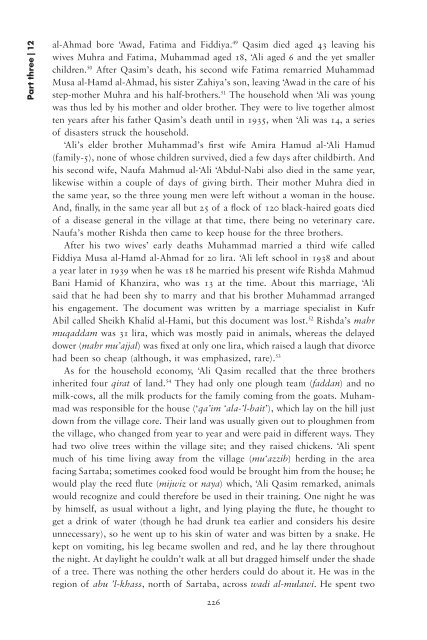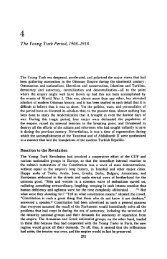Governing property, making the modern state - PSI424
Governing property, making the modern state - PSI424
Governing property, making the modern state - PSI424
You also want an ePaper? Increase the reach of your titles
YUMPU automatically turns print PDFs into web optimized ePapers that Google loves.
Part three | 12<br />
al-Ahmad bore ‘Awad, Fatima and Fiddiya. 49 Qasim died aged 43 leaving his<br />
wives Muhra and Fatima, Muhammad aged 18, ‘Ali aged 6 and <strong>the</strong> yet smaller<br />
children. 50 After Qasim’s death, his second wife Fatima remarried Muhammad<br />
Musa al-Hamd al-Ahmad, his sister Zahiya’s son, leaving ‘Awad in <strong>the</strong> care of his<br />
step-mo<strong>the</strong>r Muhra and his half-bro<strong>the</strong>rs. 51 The household when ‘Ali was young<br />
was thus led by his mo<strong>the</strong>r and older bro<strong>the</strong>r. They were to live toge<strong>the</strong>r almost<br />
ten years after his fa<strong>the</strong>r Qasim’s death until in 1935, when ‘Ali was 14, a series<br />
of disasters struck <strong>the</strong> household.<br />
‘Ali’s elder bro<strong>the</strong>r Muhammad’s first wife Amira Hamud al-‘Ali Hamud<br />
(family-5), none of whose children survived, died a few days after childbirth. And<br />
his second wife, Naufa Mahmud al-‘Ali ‘Abdul-Nabi also died in <strong>the</strong> same year,<br />
likewise within a couple of days of giving birth. Their mo<strong>the</strong>r Muhra died in<br />
<strong>the</strong> same year, so <strong>the</strong> three young men were left without a woman in <strong>the</strong> house.<br />
And, finally, in <strong>the</strong> same year all but 25 of a flock of 120 black-haired goats died<br />
of a disease general in <strong>the</strong> village at that time, <strong>the</strong>re being no veterinary care.<br />
Naufa’s mo<strong>the</strong>r Rishda <strong>the</strong>n came to keep house for <strong>the</strong> three bro<strong>the</strong>rs.<br />
After his two wives’ early deaths Muhammad married a third wife called<br />
Fiddiya Musa al-Hamd al-Ahmad for 20 lira. ‘Ali left school in 1938 and about<br />
a year later in 1939 when he was 18 he married his present wife Rishda Mahmud<br />
Bani Hamid of Khanzira, who was 13 at <strong>the</strong> time. About this marriage, ‘Ali<br />
said that he had been shy to marry and that his bro<strong>the</strong>r Muhammad arranged<br />
his engagement. The document was written by a marriage specialist in Kufr<br />
Abil called Sheikh Khalid al-Hami, but this document was lost. 52 Rishda’s mahr<br />
muqaddam was 31 lira, which was mostly paid in animals, whereas <strong>the</strong> delayed<br />
dower (mahr mu’ajjal) was fixed at only one lira, which raised a laugh that divorce<br />
had been so cheap (although, it was emphasized, rare). 53<br />
As for <strong>the</strong> household economy, ‘Ali Qasim recalled that <strong>the</strong> three bro<strong>the</strong>rs<br />
inherited four qirat of land. 54 They had only one plough team (faddan) and no<br />
milk-cows, all <strong>the</strong> milk products for <strong>the</strong> family coming from <strong>the</strong> goats. Muhammad<br />
was responsible for <strong>the</strong> house (‘qa’im ‘ala-’l-bait’), which lay on <strong>the</strong> hill just<br />
down from <strong>the</strong> village core. Their land was usually given out to ploughmen from<br />
<strong>the</strong> village, who changed from year to year and were paid in different ways. They<br />
had two olive trees within <strong>the</strong> village site; and <strong>the</strong>y raised chickens. ‘Ali spent<br />
much of his time living away from <strong>the</strong> village (mu‘azzib) herding in <strong>the</strong> area<br />
facing Sartaba; sometimes cooked food would be brought him from <strong>the</strong> house; he<br />
would play <strong>the</strong> reed flute (mijwiz or naya) which, ‘Ali Qasim remarked, animals<br />
would recognize and could <strong>the</strong>refore be used in <strong>the</strong>ir training. One night he was<br />
by himself, as usual without a light, and lying playing <strong>the</strong> flute, he thought to<br />
get a drink of water (though he had drunk tea earlier and considers his desire<br />
unnecessary), so he went up to his skin of water and was bitten by a snake. He<br />
kept on vomiting, his leg became swollen and red, and he lay <strong>the</strong>re throughout<br />
<strong>the</strong> night. At daylight he couldn’t walk at all but dragged himself under <strong>the</strong> shade<br />
of a tree. There was nothing <strong>the</strong> o<strong>the</strong>r herders could do about it. He was in <strong>the</strong><br />
region of abu ’l-khass, north of Sartaba, across wadi al-mulawi. He spent two<br />
226












